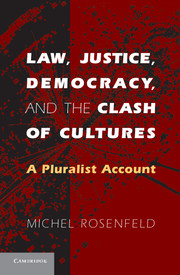Book contents
- Frontmatter
- Contents
- Introduction
- Part I Liberal Justice and Fleeting Specters of Unity
- Part II E Pluribus Unum?
- Part III Can Pluralism Thrive in Times of Stress?
- 7 Rethinking Political Rights in Times of Stress
- 8 Derrida’s Deconstructive Ethics of Difference Confronts Global Terrorism
- 9 Habermas’s Discourse Ethics of Identity and Global Terror
- 10 Conclusion
- Bibliography
- Index
8 - Derrida’s Deconstructive Ethics of Difference Confronts Global Terrorism
Can Democracy Survive the Autoimmune Ravage of the Terror Within Us?
from Part III - Can Pluralism Thrive in Times of Stress?
Published online by Cambridge University Press: 05 June 2012
- Frontmatter
- Contents
- Introduction
- Part I Liberal Justice and Fleeting Specters of Unity
- Part II E Pluribus Unum?
- Part III Can Pluralism Thrive in Times of Stress?
- 7 Rethinking Political Rights in Times of Stress
- 8 Derrida’s Deconstructive Ethics of Difference Confronts Global Terrorism
- 9 Habermas’s Discourse Ethics of Identity and Global Terror
- 10 Conclusion
- Bibliography
- Index
Summary
Beyond the threats it may pose to our security, global terrorism has had a dramatic impact on our psyche, our imagination, and the ethos of our age. As stressed since the outset, global terrorism has inscribed itself alongside a series of evolving shifts, including those toward the disenchantment of reason, toward globalization tied to balkanization, toward the politicization of religious fundamentalism, and toward the replacement of modernism by subjectivism and postmodernism. Taken together, these changes have severely jolted, if not completely derailed, the project of the Enlightenment. Moreover, whether ultimately closely linked to the aforementioned recent trends or independent from them, global terrorism stands out for the ferocity with which it apparently undercuts all the major expressions of contemporary ethos and seemingly systematically debunks the key premises upon which the latter are grounded.
Although modalities and nuances abound, there are essentially three different approaches to ethics conceived in terms of binding self to other by properly and fairly accounting for all the relevant identities and differences that emerge in the course of intersubjective dealings between the two. Post-modern ethics, as molded by Derrida’s deconstructive approach, is an ethics of difference: Self and other are identical as equals, and their ethical duty to one another is to accept, take into account, and act consistent with the singularity of the other before them, hence giving recognition and respect for all the differences embraced by the latter. In contrast, ethics grounded in modernism, as exemplified by Habermas’s Kantian-based discourse ethics, places paramount importance on the universal, on that which binds together humankind as a whole, and hence requires self and other to interact as ethical beings endowed with equal dignity based on bonds of identity. In other words, above all differences, there are universal links of identity that provide the grounding for equal dignity. Finally, as against Derrida’s post-modern ethics of difference, which will be discussed in this chapter, and as against Habermas’s modern ethics of identity to be examined in Chapter 9, comprehensive pluralism, with its commitment to confront the dialectic between identity and difference or between the one and the many, all the way up and all the way down, sketches out an ethics that is neither tilted to identity nor to difference. Instead, pluralist ethics endeavors to blend identity and difference and to preserve as much of each of the two as possible in light of the particular contextual circumstances in play.
- Type
- Chapter
- Information
- Law, Justice, Democracy, and the Clash of CulturesA Pluralist Account, pp. 251 - 270Publisher: Cambridge University PressPrint publication year: 2011



